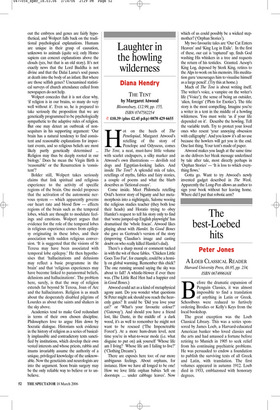Laughter in the howling wilderness
Diana Hendry
THE TENT by Margaret Atwood Bloomsbury, £12.99, pp. 155, ISBN 0747582254 ✆ £10.39 (plus £2.45 p&p) 0870 429 6655 Hot on the heels of The Penelopiad, Margaret Atwood’s retelling of the story of Penelope and Odysseus, comes The Tent, a neat, must-have little volume with scarlet endpapers, a silky marker and Atwood’s own illustrations — devilish red dogs and Egyptian-looking ladies. And inside The Tent? A splendid mix of tales, retellings of myths, fables and fairy stories, a couple of poems and what the blurb describes as ‘fictional essays’.
Come inside. Meet Philomela retelling Ovid’s horror story of bigamy and her metamorphosis into a nightingale, Salome wooing the religious studies teacher (they both lose their heads) and Horatio trying to obey Hamlet’s request to tell his story only to find that ‘some jumped-up English playwright’ has dramatised the ‘whole fracas’. Atwood likes playing about with Hamlet. In Good Bones she gave us Gertrude’s version of the story (improving Claudius’s image and casting doubt on who really killed Hamlet’s dad).
There’s a sharp moral or comment tucked in with the wit of these fables. ‘Chicken Little Goes Too Far’, for example, could be a homily on global warming. Remember this chick? The one running around saying the sky was about to fall? A whistle-blower if ever there was. (The Little Red Hen had a happier end in Good Bones.) Atwood could act as a kind of metaphysical agony aunt. Do you wonder what questions St Peter might ask should you reach the heavenly gates? It could be ‘Did you love your cat?’ or ‘What’s your favourite colour?’ (‘Gateway’). And should you have a friend lost, like Dante, in the middle of a dark wood, it’s as well to remember he might not want to be rescued (‘The Impenetrable Forest’). At a more hum-drum level, next time you’re in what-to-wear mode (i.e. what disguise to put on) ask yourself ‘Whose life am I living? Whose life am I failing to live?’ (‘Clothing Dreams’).
There are exposés here too: of our more ambiguous feelings. About orphans, for instance. How we have all longed to be one! How we love little orphan babies ‘left on doorsteps ... under cabbage leaves’. Now which of us could possibly be a wicked stepmother? (‘Orphan Stories’).
My two favourite tales are ‘Our Cat Enters Heaven’ and ‘King Log in Exile’. In the first of these, our cat is ‘raptured’ up, finds God washing His whiskers in a tree and requests the return of his testicles. Granted. Aesop’s King Log, deposed by Stork King, retires to the Alps to work on his memoirs. His meditation guru ‘encourages him to visualise himself as a large pencil’. (Try this at home.) Much of The Tent is about writing itself. The writer’s voice, a vampire on the writer’s life (‘Voice’); the sense of being an outsider, ‘alien, foreign’ (‘Plots for Exotics’). The title story is the most compelling. Imagine you’re a writer in a tent in the middle of a howling wilderness. You must write ‘as if your life depended on it’. Describe the howling. Tell the variable truth. Try to protect your loved ones who resent ‘your annoying obsession with calligraphy’. And you know it’s all no use because the howlers will get you in the end. One last thing. Your tent’s made of paper.
Atwood makes you laugh at the same time as she delivers her bleak message underlined by tale after tale, most directly perhaps in ‘Orphan Stories’ — ‘It is loss to which everything flows.’ Gotta go. Want to try Atwood’s newly invented gadget described in The Week. Apparently the Long-Pen allows an author to sign your book without her leaving home. Where did I put that robotic arm?


















































































 Previous page
Previous page